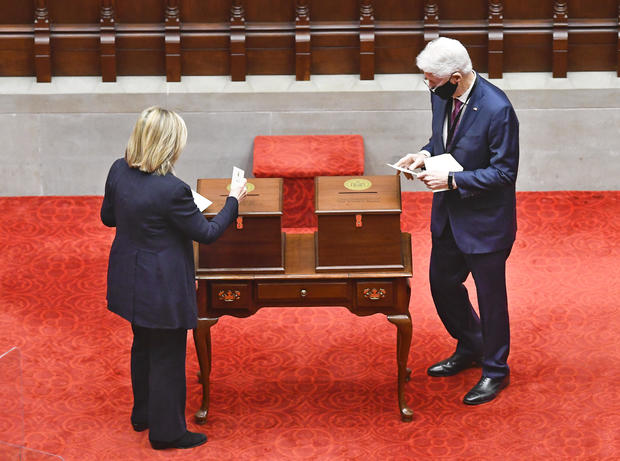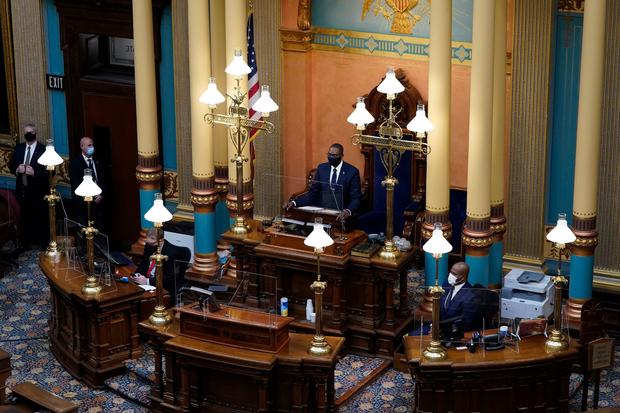All 538 electors have voted, formalizing Biden's 306-232 win. Here's how the Electoral College works.
All 538 electors voted Monday in the Electoral College, formalizing President-elect Joe Biden's victory in the 2020 presidential election. Their votes will next be sent to Washington to be counted by Congress on January 6.
Hawaii's four electors voted shortly after 7 p.m. to make the final tally 306 Electoral College votes for Mr. Biden to 232 for President Trump. At 5:30 p.m. ET, California's electors cast their state's 55 Electoral College votes for Mr. Biden, putting him over the 270 needed to win.
Mr. Biden spoke Monday night after the count had concluded, urging Americans to move forward after the election. While he struck a unifying tone toward the end of his speech, he also highlighted some of Mr. Trump's many legal challenges and his refusal to concede, calling it an "assault on democracy."
Mr. Trump's last-ditch legal attempts to overturn the results have been quashed in the courts. On Friday, the Supreme Court rejected a lawsuit filed by Texas Attorney General Ken Paxton that sought to stop electors in four key battleground states from voting Monday.
What happened prior to December 14?
Election Day is set by law as the Tuesday that follows the first Monday in November, which in 2020 fell on November 3. When people cast their ballots, they are actually voting for an elector committed to supporting their choice for president and vice president.
After the polls close, the states count and, eventually, certify the votes. All states have certified their results. California was the last to do it, on December 11.
The U.S. Code says that if any state has enacted procedures to settle any controversies over electors before Election Day and if the results have been determined six days before the electors meet, they qualify for "safe harbor." Congress is required to consider those results as "conclusive." This date is known as the "Safe Harbor" deadline.
What exactly happened on Monday?
Federal law dictates the electors meet on the Monday in December that follows the second Wednesday, which in 2020 falls on December 14.
There are 538 electors. The number from each state is based on population and is equal to the number of members of Congress the state has in the House and Senate, meaning the minimum any state can have is three. The state with the most electors is California, with 55. Washington D.C. has three electors even though it is not a state.
All but two states, Maine and Nebraska, give all their Electoral College votes to the candidate who got the most votes in the state. Maine awards two of its four electoral votes to the statewide winner but also allocates an electoral vote to the popular vote winner in each of its two congressional districts. Nebraska gives two of its five electoral votes to the statewide winner, with the remaining three going to the popular vote winner in each of its three congressional districts.
Based on the outcome of the November election, 306 electors will vote for Mr. Biden and 232 will vote for Mr. Trump.
The electors will cast ballots, individually and on paper, for president and vice president. The electors count the votes and then sign six certificates, known as the Certificates of the Vote. The certificates are paired with the Certificates of Ascertainment provided by states' governors and are signed, sealed and certified.
The six copies are then sent via registered mail to the president of the Senate (aka Vice President Mike Pence); two are sent to the secretary of state of the state in which the electors met; two are sent to the archivist and one is sent to judge of the U.S. district court of the district in which the electors met.
The votes will take place at different times throughout the day, starting at 10 a.m. ET and concluding with Hawaii at 7 p.m. ET. In Michigan, state House and Senate offices are closed because of "credible threats of violence" — not because of "anticipated protests" — and as a result, electors will have police escorts from their cars to the capitol building, according to a spokesperson for state Senate Majority Leader Mike Shirkey. Michigan's Electoral College members cast their ballots for Mr. Biden, who won the state despite Mr. Trump's efforts to challenge it in court.
Electors are not necessarily bound by law to vote according to the state's results, and there were 10 "faithless electors" in 2016. But most states have laws that nullify the votes of "faithless electors," and the Supreme Court ruled in July that states can punish them. FairVote found that since the founding of the Electoral College, there have been 167 faithless electors.
Who are the electors?
Sometime between May and August, states' political parties and independent candidates nominate electors for each ticket. The Constitution doesn't state how states must pick electors, so most candidates are nominated by state party committees or at a state party convention.
Electors may not be U.S. senators, members of Congress or anyone holding an "Office of Trust or Profit under the United States."
Most of the electors are not famous, but there are a few big names this year. Former President Bill Clinton, 2016 Democratic nominee Hillary Clinton and New York Governor Andrew Cuomo are all Democratic electors for New York, and South Dakota Governor Kristi Noem was set to be an elector for South Dakota but bowed out last week.
Stacey Abrams, the 2018 Georgia Democratic gubernatorial candidate, is a Georgia elector. She was selected to preside over the meeting that backed Mr. Biden and Vice President-elect Kamala Harris.
Michigan House Speaker Lee Chatfield issued a statement Monday saying that the state House will not be choosing a new slate of electors. A GOP lawmaker had indicated he was part of a group that supported choosing new electors, according to the Detroit Free Press. Michigan Representative Gary Eisen also would not rule out the possibility of violence.
Chatfield said he "fought hard" for Mr. Trump, but he "can't fathom risking our norms, traditions to pass a resolution retroactively changing the electors for Trump simply because some think there may have been widespread fraud to give him a win."
Can Mr. Trump still challenge the results after the electors vote?
It is possible for Congress to challenge the results in a state that did not meet the December 8 deadline. Congressman Mo Brooks, of Alabama, has said that he plans to challenge electoral votes for Mr. Biden when Congress reconvenes on January 6. He would need to be joined by one senator and present his objection in writing, and then both houses of Congress would debate the objections and vote on whether to sustain them, according to The Associated Press.
In a statement last week, attorneys for the Trump campaign quoted the dissenting opinion in the 2000 Supreme Court Bush v. Gore ruling that January 6 is the date of "ultimate significance."
"Despite the media trying desperately to proclaim that the fight is over, we will continue to champion election integrity until legal vote is counted fairly and accurately," attorneys Rudy Giuliani and Jenna Ellis said.
What are the next major dates?
- December 23: All copies of the electors' votes must be delivered to the recipients.
- January 6: Congress will count the votes of the electors. Procedure calls for Pence to open each state's "certificate of ascertainment" — documents prepared by the state after it has completed its vote count and ascertained the official results. He will then present the certificate to four "tellers" who announce result tallies. Once a candidate reaches 270 electoral college votes, Pence will declare the winner.
- January 20: Mr. Biden will be inaugurated.
Grace Segers, Adam Brewster and Audrey McNamara contributed to this report.





